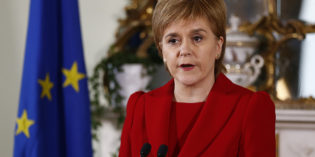Tag: EU referendum

‘I want my country back’: Emotion and Englishness at the Brexit ballotbox
The three phases of Brexit – campaign, referendum, aftermath – have revealed three urgent problems, writes Russell Foster: the lack of public faith in establishment politics, the emotional deficit of the EU, and the return of English nationalism. All three stages of Brexit have been characterised by contempt, anger and despair unseen in recent British politics […]

The UK’s referendum and post-fact politics: How can campaigners be held accountable for their claims?
Both sides of the UK’s EU referendum campaign were criticised for presenting misleading information to the public. Alan Renwick, Matthew Flinders and Will Jennings write that the referendum highlighted the inability of the British political system to enforce standards of factual accuracy in how politicians campaign. They argue that while legal or regulatory changes could alter […]

It would be a democratic travesty for Brexit not to be accepted simply because many of us don’t like it
The result of the referendum on the UK’s continued membership of the European Union has upset a great number of people, and some have suggested that the result should not be accepted. Here, Stephen Tierney asks ‘how democratic was the Brexit vote?’ and concludes that to not accept the result would constitute a democratic outrage. […]

Is there a future for referendums?
The EU referendum has led to doubts about referendums as an instrument of public policy. Albert Weale suggests that the good conduct of referendums depends on the question being clear and voters having easy access to the relevant evidence. The EU referendum failed both of these tests. Future referendums should be on well-defined questions and steps should […]

‘Post-truth’ politics are a debasement of standards in public life
Verbal dexterity, inconsistency and ‘spin’ are part and parcel of normal politics but the exaggerations and distortions of the EU referendum campaign has led to concerns about ‘post-truth’ politics. Nicholas Allen and Sarah Birch write there is a need for someone to provide a moral lead, and argue the Committee for Standards in Public Life […]

The Brexit shambles: Charting a path through the rubble
In a paper published this week by Nuffield College, Oxford Jim Gallagher argues that in responding to June’s Brexit vote the UK and Scottish governments must proceed rationally, on the basis of the evidence, and pursue the national interest. They should not feel bound by the Leave campaign’s promises and should seek to stay in, […]

The EU referendum and some paradoxes of democratic legitimacy
Referendums are potentially destabilising in parliamentary democracies because they generate alternative, competing sources of legitimacy, writes Nat le Roux. A majority of elected representatives may hold one view on a matter of national importance, and if a referendum demonstrates that a majority of the public hold the opposite view, which manifestation of democratic legitimacy should […]

The Brexit paradox: Direct democracy is a flawed route to reviving sovereignty
Rhetoric around parliamentary sovereignty and “taking back control” became a recurring theme in the Leave Campaign. But Panagiotis Doudonis argues that there is a contradiction in using a referendum – a coercive, direct democracy device – to reclaim parliamentary sovereignty, which has its foundations in representative democracy. Similar PostsLong Read: Brexit, the Referendum and the […]

Could a ‘reverse Greenland’ arrangement keep Scotland and Northern Ireland in the EU?
While no member state has ever left the European Union, Greenland opted to leave the EEC in 1985. Ulrik Pram Gad assesses what lessons the case of Greenland might have for the UK following its decision to leave the EU. He suggests that while the two situations are radically different, Greenland could serve as inspiration […]

Why there should be a general election before Article 50 is triggered
The Conservative Party is currently selecting a new leader who is expected to trigger Article 50 and begin the process of the UK leaving the European Union. Kenneth Armstrong writes that as the UK will need to set out what sort of new relationship it wants with the EU, there is a clear case for an […]


 Democratic Audit's core funding is provided by the Joseph Rowntree Charitable Trust. Additional funding is provided by the London School of Economics.
Democratic Audit's core funding is provided by the Joseph Rowntree Charitable Trust. Additional funding is provided by the London School of Economics.